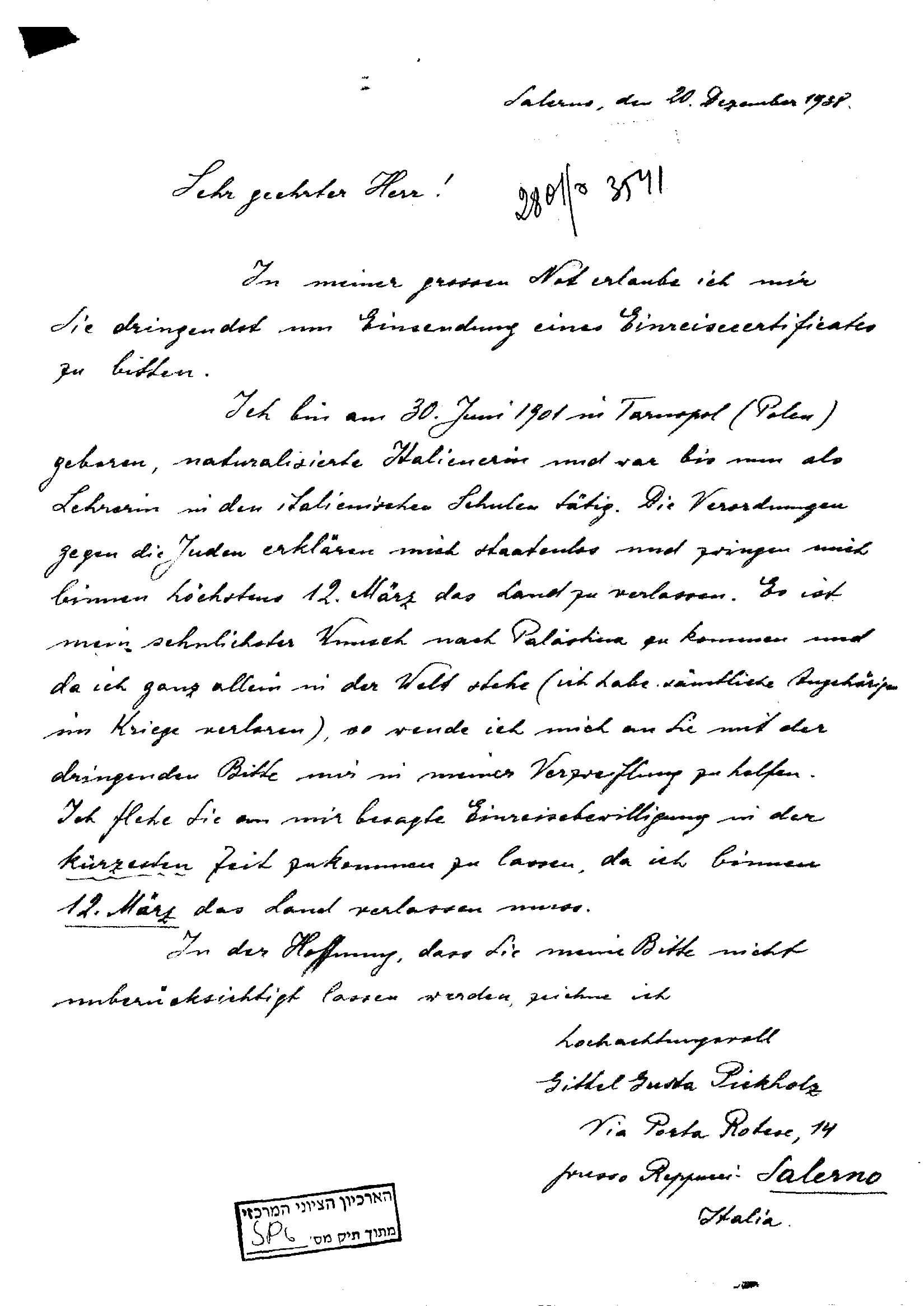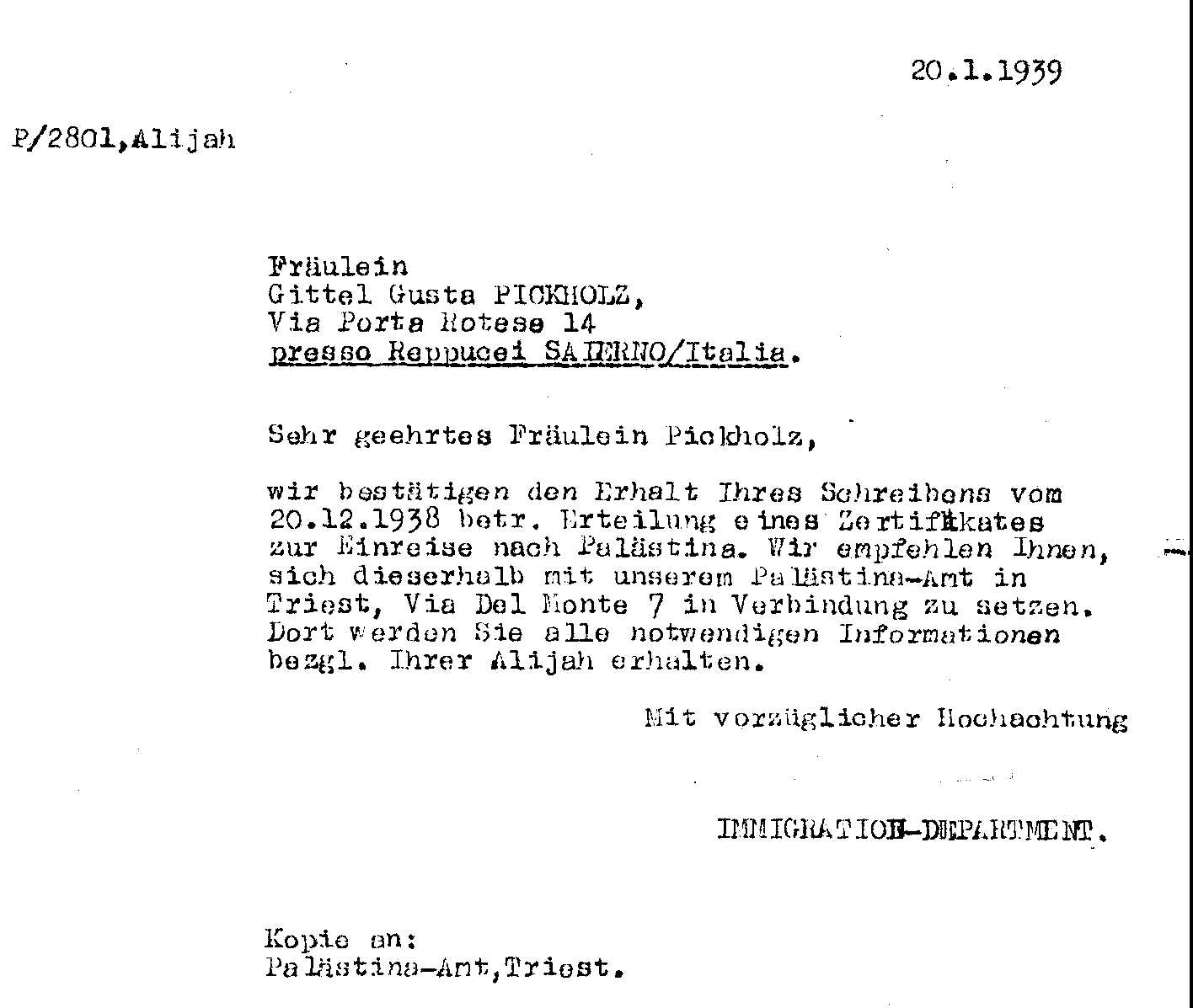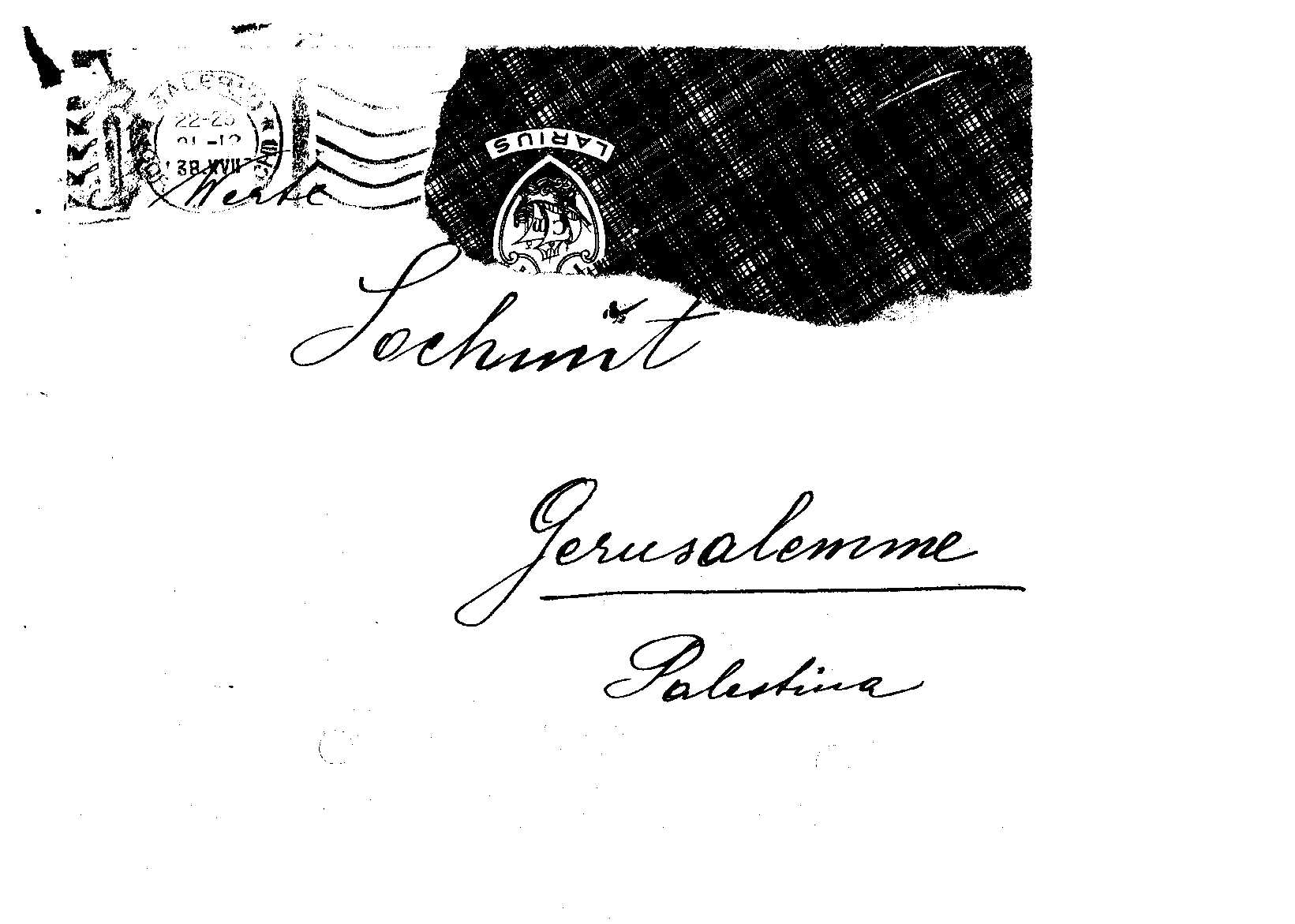"Dear Israel,
thank you for having written me. However, I don't know the English
language. My son Andrea translated it for me. I am answering you in Italian.
If you want to avoid looking around for a translator, get in touch with
Herman Marek. You can reach him through GHETTO FIGHTERS' HOUSE MUSEUM -
Lohamei Haghetaot M.P. Western Galilee 25220 - Israel. He knows Italian
very well and also writes it. He takes care of the Museum to the Memory
of the Children. In order to answer adequately to your straight questions,
my response will have to be a bit more lengthy. And that's good. The Jews
in Valtellina? There were two periods. The first from Sept
29, 1941 to Oct 25, 1943. It is in this period that, due to the laws
on race of 1938, the Italian army (as far as the APRICA in Valtellina is
concerned) takes numerous families in the Balkan region away from the Germans
and the Croatian Ustasha. On March 3, 1943, the Jews in APRICA count about
300 altogether. This is what a note of the Interior Ministry, Head of Police,
to the Interior Ministry, says. Subject: The Jews interned in APRICA. The
number, starting with 144 in 1941, reached 215, and then 272, and finally
approached 300 in 1943. The above-mentioned letter reveals that it was
almost impossible to get the number in Aprica reduced. All other
places in Italy did not admit any more arrivals. It says: "In the province
of SONDRIO, and to be exact, in the town of APRICA, about 300 Jews of Balcan
origin have been interned for some time. Part of them have
been permitted officially to reside in Sondrio because they had problems
with the mountain climate. It is pointed out that the afore-mentioned Jews
urgently need to be interned somewhere else, for the following reasons:
(basically, it was feared that there would be some contact of the antifascist
ideas of the Jews with the natives or villagers or refugees [evacuated
persons] in the plains of Lombardy. Also eventual contacts with
"the community of Aprica [which is] too close to Switzerland and therefore
it is not commendable to leave the Jews there who at any moment may take
up contacts with elements beyond the border, possibly through third
parties." Fear of the intelligence, and finally: "The Jews in Aprica
stir the miscontent of the local population because they acquire the rationed
goods at exorbitant prices." (sic!) We know that among the 272 Jews in
Aprica, 218 were considered poor. The administrative department of
the local police headquarters of Sondrio, paid out 8 Lire daily to the
head of family, 4 for the wife, and 3 for every child, so they were living
in abundance! Plus 50 Lire monthly for rent or lodging. The Jews were lodged
in private houses or in guesthouses/hotels: the Mirafiori, the San Pietro,
the Aprica, and a co-operative kitchen in the Albergo Posta in the neighborhood
of MAVIGNA. Salomon Mosic was the elected representative of those interned
in Aprica. Riccardo Kohn was the president of the Palestine Office of Zagabria,
and then, in Switzerland, the director of administration of an institution
for young Zionists at Bex near the valley of Rodano. These two and a third
[person] were the elected heads, and they dealt with the authorities of
Sondrio in whatever problems there were. Who watched over the Jews of Aprica?
Two officers of the carabinieri: Luigi Tosetti, who became head of the
partisan detachment in Valle Camonica. He died March 19, 1945 through the
explosion of a hand grenade. The other, Bruno Pilat, finished in Mauthausen.
Friendly guardians. Let us not forget that some Jews in Sondrio were put
up in rented houses. Aprica is situated at 1170 meters above sea-level.
This does not cause any problem to those suffering from high-altitude syndrom.
It is a large former pasture in the shape of a half-curve, vast and airy.
It is the passage from the province of Sondrio to that of Brescia. If one
continues from there, one arrives at the Tonale Pass, and finally in Trentino.
From Aprica one can walk on non-dangerous paths through the shrubbery
to arrive there, one crosses the national road and can climb up further,
either by Villa di Tirano (Lughina Pass) or, slightly to the south, through
Bianzone-La Bratte-Baita Campione, the Anzana Pass (2200 m), and descend
to the Salent valley which leads to Campascio in the Poschavio valley.
Sept 9, 1943 - Mosic and Khon write a plea to the Police headquarters of
Sondrio. They are asking for all of them to be permitted to leave Aprica.
A nice good-bye letter. The Police writes to the Interior Ministry and
submits the request (absolutely no negative implication by the Police president).
The evening of Sept 8."
...................... ISRAEL, THIS IS A LENGTHY ACCOUNT OF ALL THAT
HAPPENED DURING THIS TIME BUT NO NAMES ARE MENTIONED. THIS MAN HAS
GONE
THRU GREAT TROUBLE + EFFORT TO PUT IT ALL TOGETHER FOR YOU. IT IS
PROBABLY
A SUMMARY OF HIS BOOK (THIS IS MY ASSUMPTION) BUT WITH PAINSTAKING
DETAIL.
I SHALL LEAVE OUT MOST OF PAGE 4 AND ALL OF PAGE 5 PLUS HALF OF
PAGE 6.
THERE HE WRITES:
"That is the story of what followed. And the Jews? Shadows. Legends.
I wanted to bring the shadows to light and finish with the legends. I am
very sorry, but I know nothing much about Augusta Pickholz. The Memory
Book of Liliana Picciotto Fargion mentions her on page 474: 'Pickholz
Augusta, born in Tarnopol in Poland on 30-6-1901. Last residence recorded:
SONDRIO. Imprisoned in the prison of Milan. Deported from Milan to
Auschwitz on 30-1-1944. Number doubtful. Died there and date unknown:
Document 1a Transport 06. (Augusta Pickholz, judging by the characteristics
of Transport 06, must have been arrested while trying to
get to Switzerland.)"
PAGE SEVEN:
"Dear Israel, I am rich in time and patience. My relations with the
Jews started in November 1942 when I was in hospital for lethal diphtheria.
Chances were I would not survive. When I came to, I saw a young woman who
stood by the door. She wore a beautiful blue night-gown, had black
hair, and she smiled at me. My mother told me: 'She is Jewish". Indeed.
59 years have passed, but after researching like mad I know today that
her name was Amendola Giuseppina, born in Kenosha (Wisconsin, USA) on March
17, 1917 - the daughter of Salvatore and Larancio Maria. She was
described as North-American Aryan in the list of refugees of Sept 10, 1943.
She was confined to Aprica. That sight was real. But the register of the
hospital gave three entries and three discharges. First as born in Aprica,
and resident of Aprica. Then born in Canoscia Wiri, then born in Canoscia
[Kenosha - IP] Viscaya [Basque region]. I got bogged down in
vain researches in the region of Bilbao in the Basque region. All this
as a consequence of errors in the entries, of the malcomprehension of languages
and lack of knowledge. Probably Guiseppina was the daughter of Italian
emigrants, in a town famous for its canned food, and 150 km from Chicago.
How come she was together with Kroats, Serbs and Jews from the Balkans?
We shall never
know. I have engaged in a long voyage into the past. This is why I
remain watchful so it will not happen again. Best regards, Ferruccio Scala
"
Miriam writes:
THIS MUST BE A VERY NICE MAN. HE SURE DESERVES A WARM THANKYOU...
( I
apologize immediately for meddling! but I feel very touched by the
way,
and what, he writes) ON THE LAST PAGE HE DESCRIBES THE PHOTOGRAPHS,
AND
ASKS YOU TO MAKE THEM KNOWN/HAND THEM TO THE APPROPRIATE PLACES
IN ISRAEL
AND AMERICA SAYING "WHO KNOWS..." THE PHOTOS ARE ALL FROM THE MEMORIAL
CEREMONY - ON PHOTOS 2 and 6 YOU SEE FERRUCCIO SCALA (THE ONE WITH
THE
YELLOW JACKETT). PHOTO 7 SHOWS A GUY AGED 86 NOW WHO WROTE A DIARY
IN THE
PERIOD IN QUESTION. |


